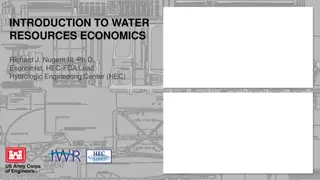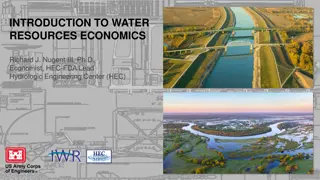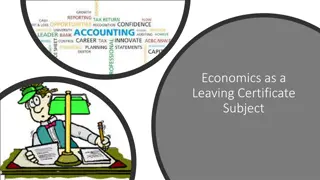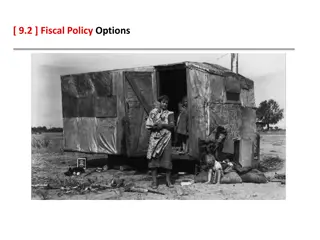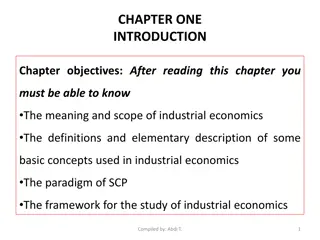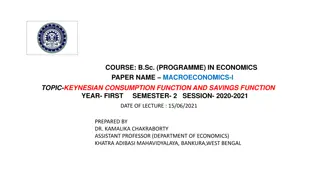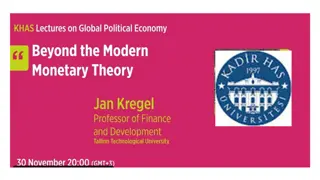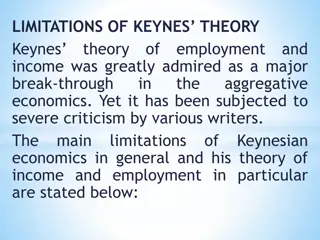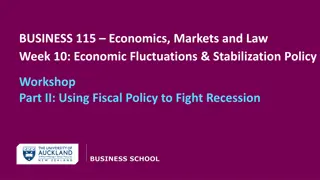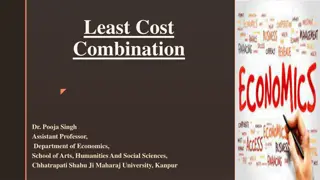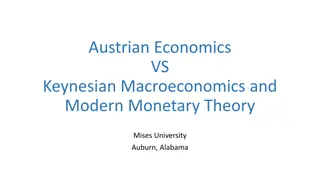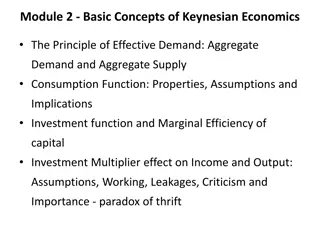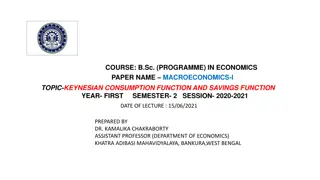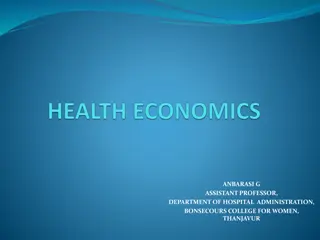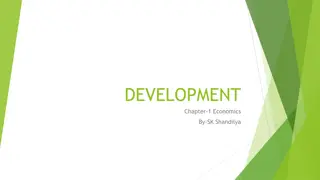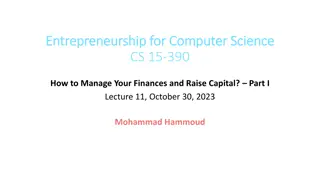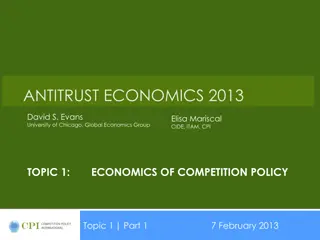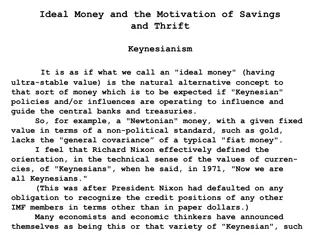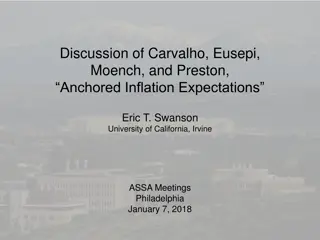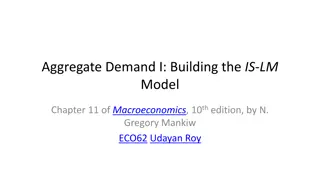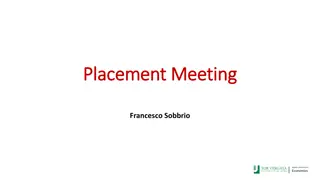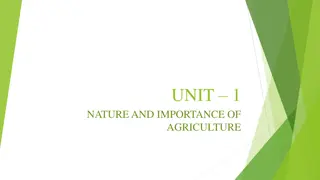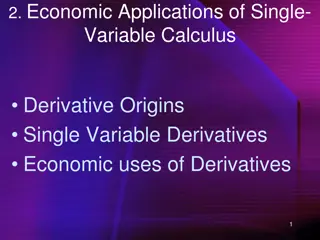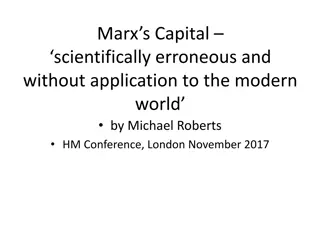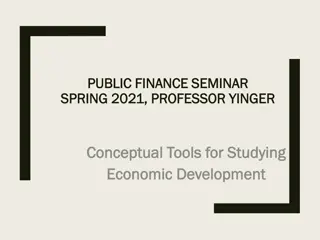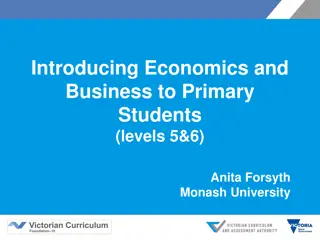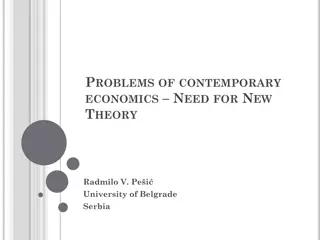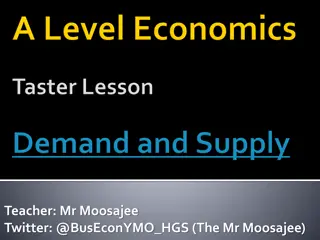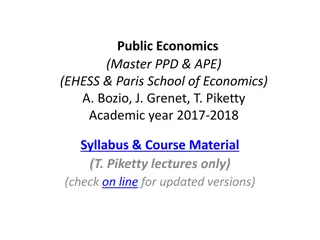Water Resources Economics
This resource introduces the principles of water resources economics, focusing on decision-making, cost-benefit analysis, and the role of economics in flood risk management and national development. It discusses how economics influences individual and government decisions in managing limited resourc
3 views • 14 slides
Introduction to Experimental Economics by John Hey: A Comprehensive Overview
Explore the interconnected realms of Experimental Economics and Behavioral Economics through the insightful lectures of John Hey, an Emeritus Professor at the University of York. Discover the methodology of testing economic theories for validity and the practical applications of experimental economi
2 views • 58 slides
Water Resources Economics and Public Policy
Explore the foundations of water resources economics through topics such as decision-making, public economics perspectives, flood control acts, cost-benefit analysis, and optimization. Gain insights into how economics influences individual, household, organizational, and governmental decision-making
4 views • 15 slides
Economics as a Leaving Certificate Subject
Economics as a Leaving Certificate subject prepares students for diverse career paths in business, finance, and management. The course includes a research project and a structured exam format. With a focus on theory, practical application, and real-world economic concepts, Economics equips students
5 views • 11 slides
Elevate Your Scores Master the IB Economics (SL and HL) Examination
Unlock your potential and excel in the IB Economics (SL and HL) Examination with our comprehensive study resources. Access practice exams, study guides, and expert tips to boost your scores. Start your journey towards academic success now!\nClick Here to Get IB-Economics Dumps With 16 USD Discount C
0 views • 7 slides
The Positive/Normative Distinction in Economics
Textbooks in economics often teach the Positive/Normative Distinction, where Positive Economics deals with facts and Normative Economics focuses on values and opinions. This distinction is a point of debate among scholars, with some arguing that values are intrinsic to all analysis. The debate also
1 views • 28 slides
Fiscal Policy Options in Economics
Explore the evolution of economic theories including classical economics, demand-side economics, and supply-side economics. Learn about the impact of key figures like John Maynard Keynes and Milton Friedman on fiscal policy decisions and the U.S. economy. Delve into the strategies employed during th
1 views • 18 slides
Overview of Industrial Economics: Scope, Evolution, and Challenges
Industrial economics delves into economic issues of firms and industries, exploring their interactions with society. This chapter discusses the meaning and scope of industrial economics, its historical evolution from classical to contemporary theories, traditional concerns like firm performance and
1 views • 71 slides
Keynesian Consumption and Savings Functions in Macroeconomics
Keynesian consumption function details the relationship between total consumption and gross national income. It emphasizes the stability of aggregate consumption and the marginal propensity to consume. Similarly, Keynesian savings function illustrates the link between savings and national income, hi
0 views • 6 slides
Origin of Hedge Funds and MMT's Economic Principles
Hedge funds began with relative value sovereign bond trades, while Modern Monetary Theory (MMT) emphasizes government as the supplier of jobs for full employment. MMT challenges traditional economic norms, advocating for deficit spending and disregarding the need for balancing budgets. It integrates
0 views • 22 slides
Critique of Keynesian Economic Theory
Keynesian economic theory, though groundbreaking, faces several limitations. These include contradictions between equilibrium and unemployment, neglect of long-term analysis, assumptions of perfect competition and a closed economy, lack of generality, and a static rather than dynamic focus. Critics
0 views • 9 slides
The Standard Economic Model and Behavioral Economics
The standard economic model, rooted in neo-classical economics, assumes rational behavior with full information and known preferences. In contrast, Behavioral Economics integrates insights from psychology to provide a more nuanced understanding of consumer behavior.
0 views • 30 slides
Fiscal Policy to Combat Recessions
Explore the role of fiscal policy in fighting recessions through stimulating aggregate demand, using government spending and tax cuts. Learn about the Keynesian multiplier effect, MPC, and different policy responses to economic fluctuations. Discover how government interventions can help stabilize t
0 views • 47 slides
Principles of Least Cost Combination in Economics
In economics, the principle of least cost combination involves determining the optimal combination of factors of production (such as capital and labor) that allows a firm to achieve maximum output at minimum cost. This is achieved by identifying the point where the isoquant curve intersects the isoc
1 views • 4 slides
Contrasting Austrian Economics vs. Keynesian Macroeconomics
Austrian Economics emphasizes human action, voluntary saving, and analyzing the entire economic order, while Keynesian Macroeconomics views the economy as inherently unstable and focuses on factors like spending, investment, and interest rates to manage recession risks. The modern macroeconomics app
1 views • 15 slides
Keynesian Economics: Effective Demand and Aggregate Supply
Keynesian economics emphasizes the importance of effective demand in determining income, output, and employment levels. Effective demand, as outlined by Keynes, is the equilibrium level of demand that is met by aggregate supply to maintain stable employment and output levels. It is influenced by fac
0 views • 37 slides
Keynesian Consumption and Savings Functions in Macroeconomics
Keynesian Consumption Function relates total consumption to national income, with stable characteristics like MPC and APC. Savings Function shows the relationship between savings and income, highlighting the Marginal Propensity to Save and Average Propensity to Save. Both functions are essential con
0 views • 6 slides
Overview of Health Economics: Key Concepts and Principles
Health economics is a vital field that explores the relationship between economics and healthcare, focusing on efficiency, value, and behavior in health production and consumption. It encompasses topics like determinants of health, demand and supply of healthcare, health sector budgeting, and equity
1 views • 12 slides
Overview of Development Economics and Goals
Development economics is a branch of economics that focuses on improving the economies of developing countries by targeting factors such as health, education, working conditions, and policies. It involves macroeconomic and microeconomic analysis to enhance domestic and international growth. Differen
2 views • 11 slides
Qualities of a Successful Economics Teacher
The role of an economics teacher is crucial in shaping students' understanding and knowledge. The qualities of an effective economics teacher include expertise in economics, mastery of teaching methodologies, use of innovative teaching techniques, and a commitment to ongoing professional development
4 views • 6 slides
Financial Intelligence and Capital Management in Entrepreneurship for Computer Science
Understanding financial intelligence is crucial for success in business. Entrepreneurs must grasp unit economics, interpret financial statements, and raise capital effectively. Unit economics is key to determining if a venture is sustainable, where the Lifetime Value of an Acquired Customer must exc
3 views • 27 slides
Economics of Competition Policy in Antitrust Practice
Understanding the importance of economics in antitrust practice is crucial as it involves applying economic concepts like markets, competition, and market power. Economists play a significant role in developing case theories and evidence, making economics indispensable in dealing with competition ag
1 views • 38 slides
Ideal Money and Keynesianism in Economic Policies
Exploring the concept of "ideal money" in contrast to Keynesian influences on central banks and treasuries. The discussion touches upon the stability of currency values, Nixon's declaration of being Keynesian, and how Keynesianism is approached as a political movement seeking wealth redistribution f
0 views • 22 slides
The Economics of Privacy: Evolution and Implications
The field of privacy economics has evolved over the years, from concealing information to exchanging it for economic benefits. Early theories by Posner and Stigler highlighted the redistributive nature of privacy decisions. Varian's work in the mid-1990s emphasized the importance of property rights
0 views • 49 slides
Endogenous Inflation Expectations in Macroeconomic Models
The paper discusses how inflation expectations were well anchored in the 2000s compared to the 1970s, exploring the factors that influenced this phenomenon. It introduces a model that includes endogenous inflation expectations and highlights the feedback, decreasing gain, and regime-switching featur
0 views • 18 slides
The IS-LM Model in Macroeconomics
This content delves into the IS-LM theory of static short-run macroeconomics, focusing on the goods market in the short run. It discusses the difference between real and nominal variables, recaps long-run macroeconomics, and explores the Keynesian Cross theory to understand short-run equilibrium. Ex
0 views • 74 slides
Guide to Pursuing a PhD in Economics: Roadmap for Success
Explore the comprehensive roadmap for pursuing a PhD in Economics, including insights on why, where, how, and when to apply. Learn about the benefits, challenges, and preparation tips for a successful application process. Discover key alternatives, such as research assistantships, internships, and j
0 views • 14 slides
The Significance of Agriculture Economics in India
Agriculture plays a crucial role in the Indian economy, contributing significantly to GDP and rural livelihoods. Agriculture Economics involves the study of resource allocation in the production, distribution, and consumption of agricultural goods. This branch of economics blends principles from gen
0 views • 24 slides
Economic Applications of Single-Variable Calculus Derivatives in Economics
In economics, derivatives play a crucial role in analyzing various economic phenomena such as marginal amounts, maximization, minimization, graphing, elasticity, and growth. This involves understanding derivatives of single-variable functions, slopes, instantaneous slopes, and the applications of de
0 views • 75 slides
Marx Versus Keynes: A Critical Examination of Economic Theories
Michael Roberts critiques Marx's Capital as scientifically erroneous and irrelevant to the modern world, contrasting it with Keynesian economics which questions the applicability of communist doctrine in contemporary society. The debate revolves around value theory, production, economic crises, and
0 views • 41 slides
Fiscal Policy Issues and the Government Debt
Explore the causes of the Great Depression, differing views on fiscal policy, impacts of budget deficits on trade deficits, and key issues related to government debt. Learn about public debt concerns, effects of Social Security and Medicare programs, and debates on balanced budget amendments. Delve
0 views • 53 slides
Economics: Demand, Supply, and Equilibrium
Explore the fundamental concepts of economics, including the nature and scope of economics, demand, and its determinants. Learn about normative and positive economics, microeconomics, macroeconomics, and the factors affecting demand such as income, price of the good, and complementary goods. Gain in
0 views • 19 slides
Importance of Economics Education for a Free Society
The importance of economics education in maintaining a free society is emphasized through historical quotes, current challenges, and efforts to promote economic literacy. The lack of economic knowledge among the public is highlighted as a significant issue that needs addressing. Initiatives such as
0 views • 18 slides
Economic Development: Tools and Models for Analysis
Exploring conceptual tools for studying economic development, this seminar delves into key macroeconomic models such as Keynesian, export-base, and input-output models. The simplicity and implications of a Keynesian model, including the role of savings, consumption, investments, and trade, are discu
0 views • 42 slides
Introduction to Economics & Business for Upper Primary Students
This webinar by Anita Forsyth from Monash University introduces economics concepts to upper primary students (levels 5 & 6). Key topics covered include resources, needs, wants, production, goods, services, incentives, scarcity, opportunity cost, economic decision-making, and ethical awareness. The s
0 views • 24 slides
Challenges and the Need for New Economic Theory in Contemporary Economics
The discussion highlights the shortcomings of mainstream economics and the necessity for a new economic theory that aligns with real-world scenarios. It emphasizes the importance of economics knowledge in promoting survival, growth, and sustainable prosperity, while also addressing issues such as pe
0 views • 11 slides
Economics: Explore the World of Scarce Resources, Prices, Government Policies, and Global Impacts
Delve into the intriguing realm of economics with Mr. Moosajee at HGS! Unravel the mysteries behind how scarce resources are allocated, why prices fluctuate, the impact of government policies, concerns about inflation, strategies for reducing unemployment, and more. Discover the relevance of economi
0 views • 20 slides
Public Economics Course Summary - EHESS & Paris School of Economics
The Public Economics course at EHESS & Paris School of Economics offers an introduction to taxation history, government intervention theories, and policy incidence across developed and developing countries. The syllabus covers topics like welfare analysis, wealth taxation, and optimal taxation strat
1 views • 11 slides
Course Outline: Big Data Analysis in Economics at Chiang Mai University
Dr. Woraphon Yamaka offers a comprehensive course on Big Data Analysis in Economics at the Faculty of Economics, Chiang Mai University. The course covers topics such as Data Science, Econometrics, Machine Learning, R programming, Data Visualization, Symbolic Data Analysis, Machine Learning Modeling,
0 views • 5 slides
Monetary Policy: Mainstream vs. Monetarist Perspectives
Learn about the strengths and shortcomings of monetary policy, compare mainstream (Keynesian) and monetarist (Classical) views on macroeconomic instability, discuss self-correction in the economy, and explore the debate between rules and discretion in conducting stabilization policy. Key terms inclu
0 views • 52 slides
